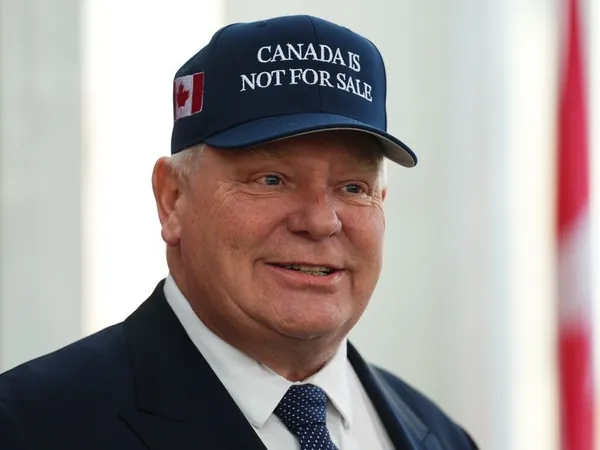
Unity on the Line: Trudeau and Premiers Rally Against Threatened U.S. Tariffs, But Alberta Premier's Support Remains Conditional
2025-01-15
Author: William
OTTAWA — Amid rising tensions over potential 25% tariffs that the United States may impose on Canadian exports, Prime Minister Justin Trudeau emphasized a united front among Canada's premiers after a crucial meeting held on Wednesday. However, Alberta Premier Danielle Smith's refusal to back the federal government’s approach has sparked concerns over national unity.
Trudeau stated the Canadian government is exploring all possible counter-measures in response to these threatened tariffs, asserting that "no one region will bear the brunt" of Canada's response. "Protecting the interests of all Canadians is our absolute priority," he added.
However, Smith, who was notably absent from the meeting due to a vacation in Panama, expressed strong reservations about the federal government's plan. "Alberta will not be able to fully support the federal government's strategy as long as it threatens export tariffs on Alberta energy," she declared in a statement. Smith criticized the notion of cutting off energy supplies to the U.S. and stated unequivocally that Alberta would "take necessary actions to protect the livelihoods of Albertans" against what she deems "destructive" tariffs.
Doug Ford, the chair of Canada’s premiers, countered Smith's position, advocating for the importance of national interests over provincial concerns. "While it's vital for each premier to protect their jurisdiction, we can't ignore the collective impact on Canada," he remarked, referring explicitly to the interdependence of Ontario's automotive sector and Alberta's oil industry.
With discussions revolving around proposed retaliatory tariffs and countermeasures, Canadian provincial leaders are unified in their desire to eliminate the idea of blocking energy exports to the U.S., a controversial suggestion that has met with significant opposition.
Saskatchewan Premier Scott Moe stressed the potential divisiveness of such proposals and urged for unity in Canada’s approach to the U.S. tariff threats. He warned that imposing such measures could create a rift not only among provinces but also between the federal and provincial governments.
As officials prepare a comprehensive response to the tariffs, Trudeau highlighted the necessity of presenting a united front, citing the importance of a "strong and proportional response." His administration has already engaged in discussions with U.S. officials, aiming to demonstrate that tariffs on Canadian goods could adversely affect American consumers.
Meanwhile, in a stark reminder of the stakes involved, Canadian Energy and Natural Resources Minister Jonathan Wilkinson underscored that U.S. tariffs could significantly increase gas prices in American markets, particularly in the Midwest.
The backdrop to this ongoing dialogue includes heightened tensions regarding border security and immigration issues, as former President Trump's administration previously linked tariff threats to Canada's handling of migrant flows and drug trafficking. Canadian officials maintain that the challenges at the border should not undermine the economic ties between the two nations.
In light of these developments, the dialogue among Canada's premiers is crucial not only for addressing immediate concerns but also for ensuring long-term stability in the region against external pressures. The pressure is on for leaders to unify and craft a robust strategy that balances provincial interests with national priorities.
As the situation continues to evolve, observers will be watching closely to see how this precarious balance of cooperation and provincial autonomy plays out in the face of international economic challenges.









 Brasil (PT)
Brasil (PT)
 Canada (EN)
Canada (EN)
 Chile (ES)
Chile (ES)
 Česko (CS)
Česko (CS)
 대한민국 (KO)
대한민국 (KO)
 España (ES)
España (ES)
 France (FR)
France (FR)
 Hong Kong (EN)
Hong Kong (EN)
 Italia (IT)
Italia (IT)
 日本 (JA)
日本 (JA)
 Magyarország (HU)
Magyarország (HU)
 Norge (NO)
Norge (NO)
 Polska (PL)
Polska (PL)
 Schweiz (DE)
Schweiz (DE)
 Singapore (EN)
Singapore (EN)
 Sverige (SV)
Sverige (SV)
 Suomi (FI)
Suomi (FI)
 Türkiye (TR)
Türkiye (TR)
 الإمارات العربية المتحدة (AR)
الإمارات العربية المتحدة (AR)